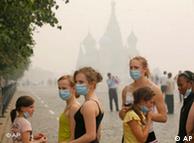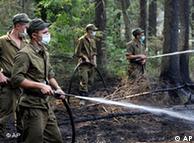RUSSIA | 10.08.2010
Heatwave could cost Russia almost one percent of GDP
Economists are suggesting the current heatwave in Russia could cost the economy between 5 and 12 billion euros ($7-15 billion) and undermine the current modest economic revival in the country.
The figure accounts for immediate losses in the agricultural, industrial and services sector, but does not factor in losses that stem from a spike in deaths and illnesses.
The heatwave has been accompanied by a persistent drought, and forest fires which have caused a thick smog to descend over Moscow.
Several leading Russian industrial firms have shut down production during the heatwave to spare workers the consequences of the high temperatures. Toxic smog from the forest and peat fires is keeping shoppers away from Moscow's shopping malls, which form the bulk of Russia's retail business.
Before the temperatures hit record highs, the economy had been expected to grow about 4 percent in 2010.
Land destroyed, prices rocket
An estimated 10 million hectares (25 million acres) of agricultural land has been destroyed due to fire and drought.
Alexander Morozov, chief economist for Russia and the CIS at HSBC, expects the heatwave and its aftermath to shave 1 percentage point off GDP growth.
 A dense smog over Moscow is hitting retail and service industries
A dense smog over Moscow is hitting retail and service industries
"The losses in agriculture now look more serious, and I expect that will contribute 0.5 percentage points. The remaining half a percent will come from other sectors - lower industrial output, lower demand and lower productivity," he said.
World wheat prices have rocketed at the fastest rate in over 30 years, and there is speculation of a food crisis. Prime Minister Vladimir Putin has banned grain exports in an attempt to keep domestic food costs down.
More expensive grain could also push up animal feed costs and force farmers to slaughter livestock.
Battling the fires
Russian firefighters are continuing to try and control wildfire blazes that have sprung up due to the heat and the drought.
An area ten times that of New York City, more than 7,600 kilometers (4,700 miles), has been scorched by the fires, and so far at least 54 people have been killed.
It is feared the fires could engulf key nuclear sites, such as Russia's main nuclear research center in Sarov and the nuclear waste processing plant at Mayak.
There are also fears that radioactive soil in areas such as Bryansk, which was affected by the Chernobyl disaster in 1986, could be swirled into the air along with ash.
The environmental group Greenpeace has accused Russian authorities of downplaying the radioactive danger, saying that 20 fires can be seen raging in contaminated areas on satellite photos.
"The elevated radioactive radiation will not lead to new contamination as with Chernobyl," said Greenpeace activist Vladimir Chuprov. "Nevertheless, smaller radioactive quantities should not be underestimated," he said.
Author: Catherine Bolsover (AFP/Reuters/dpa)
Editor: Nancy Isenson

Comments